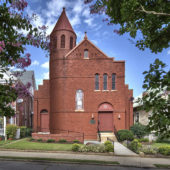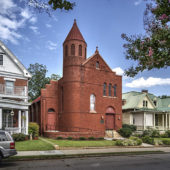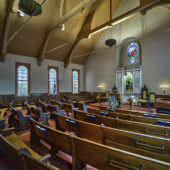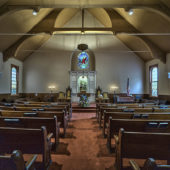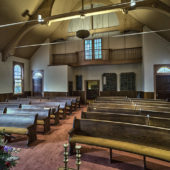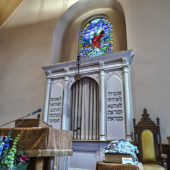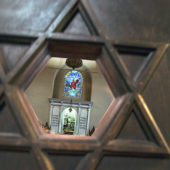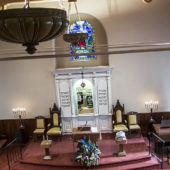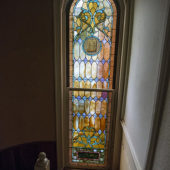A handsome historic Synagogue located in Danville’ Historic District.
Danville was formally settled in 1746 as a ferry crossing. It soon became a tobacco trading center and major textile hub. Its importance was accelerated with the completion of the railroad in 1856 and it became an major transportation center during the Civil War. After the War Jewish settlers, who were primarily merchants, arrived in Danville. Most of these early immigrants were of German origin.
As the Jewish community grew a B’nai B’rith chapter was formed in 1879. With the arrival of more Jews in the 1890s a Reform congregation, Temple Beth Sholom, and an Orthodox congregation, Agudas Achim, were established. According to a bronze plaque on the exterior of Temple Beth Sholom the congregation was formed in 1893. The granite cornerstone of the Synagogue indicates that construction was begun in 1898.
In the first decade of the 20th century Danville’s Jewish population was only 114 yet it was divided into two congregations. Agudas Achim had only nineteen members in 1907 and Beth Sholom had only nine. Agudas Achim became inactive in 1908 but a new Orthodox congregation, Aetz Chayim, was established.
By 1971 the number of Jewish retailers in Danville had grown to thirty, with a consequent growth of the Jewish population. Due to the Great Depression Aetz Chayim was no longer able to afford a full-time rabbi, however it recovered by the end of the 1930s. Initially Beth Sholom was too small to afford a rabbi. It hired its first full-time rabbi in 1935. Beth Sholom’s membership continued to increase after World War II and several of the Aetz Chayim families moved to Beth Sholom.
The size of Danville’s Jewish community peaked in 1960 at 245 people. Both of the congregations were small but each had full-time rabbis. They began to decline in size in the 1970s as Danville’s importance as a textile center began to wane. Beth Sholom had a maximum of 45 contributing members in 1962 while Aetz Chayim continued to shrink until it finally disbanded in the 1980s. Even though the city’s Jewish population has become smaller, Beth Sholom has remained active offering a wide range of Reform religious and life event services, Hebrew school, sisterhood and special holiday dinners.

